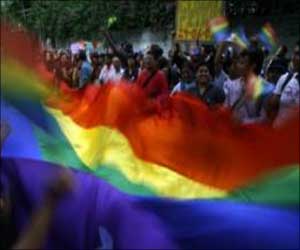Buoyed by the US Court's recent landmark decision on same sex marriage, the gay rights movement in South Korea is currently riding something of a mini-wave.

Now 50, Kim looks back on such absurdities with a degree of wry, detached humor, but for a 15-year-old realizing his true sexuality in the late '70s, South Korea could be a grim place.
"The gay community didn't really begin to emerge here until the mid-1990s, so there was a 15-year period there when things were pretty dark. It was a difficult time," he said.
But times have changed.
Buoyed by the US Supreme Court's recent landmark decision on same sex marriage, the gay rights movement in South Korea is currently riding something of a mini-wave in terms of its public profile and popular support.
Last month's gay pride parade was the largest ever, with thousands marching through central Seoul despite vocal protests by conservative Christian groups.
Advertisement
The two men had held an outdoor wedding ceremony in Seoul in September 2013 and submitted their marriage registration form to their local authority -- only for it to be rejected.
Advertisement
Making a Start
"We know the law won't change right away, but we need to make a start -- to get the issue in front of the public," Kim said in an interview in the Seoul apartment he shares with his partner.
The 20-year age difference between the two men -- Kim Seung-Hwan is 30 -- meant their experiences of growing up gay in South Korea were very different -- or, as the elder Kim put it, it was "way easier for him".
After a rural childhood, Kim Seung-Hwan graduated high school in 2004 and came to Seoul, where the gay community was by then firmly established.
"It was a revelation after all the horror stories I had been fed," he recalled.
But even among gay activists at the time, there was an unspoken rule of anonymity and very few were open about their sexual orientation in the wider community, or in the workplace.
"There was a real fear of the career consequences," the younger Kim said. "So most activists adopted nicknames, and it wasn't the done thing to ask people about their real names, ages or addresses."
The same concerns stalked Kim Jho Gwang-Soo as he started building what would prove to be a fruitful career as a film producer and director.
From Denial to Pride
In 2001, during a press conference for his movie "Wanee and Junah," a journalist asked if an obviously gay character in the movie was autobiographical.
At the time, the filmmaker had not yet publicly come out as gay.
"I denied it. Several times in fact," Kim said. "It was only the second film I had produced, and I just wasn't confident enough to get over the anxiety that it would hurt my career."
But the secrecy grated and by 2006 Kim was open about his sexuality as he produced his sixth movie, "No Regrets" -- widely seen as South Korea's first explicitly gay feature.
He remains one of just a small handful of openly gay celebrities in a still deeply conservative country where most gay and transgender people choose to remain under the radar.
The two Kims are certainly the most high-profile gay couple in South Korea and the lawsuit they filed over their marriage license is the first of its kind.
Their lawyer, Ryu Min-Hee, said she was pushing for the recognition of precedent in existing rulings where courts have struck down discriminatory family law provisions using the constitution's equal protection clause.
"We argue that the same clause can be applied in this case, which is discriminatory against a same-sex couple," Ryu said.
Legal analysts say a suit with such potentially profound consequences is unlikely to be granted by a district court, but suggest a sympathetic judge could insert some encouraging wording in his ruling that might provide support for future cases or appeals.
US Influence
Ryu believes last month's US Supreme Court ruling legalizing same-sex marriage was a watershed moment, given the level of US influence -- social, cultural and political -- over South Korea.
Ironically, the most pro-US South Koreans also tend to be social conservatives, cut from the same cloth as the Christian groups who are the most vocal opponents of gay rights.
Some of those groups, who had publicly prayed for the safe recovery of US Ambassador Mark Lippert after a knife attack in Seoul in March, were dismayed by the ambassador's attendance at -- and support for -- the gay pride march last month.
"The Supreme Court decision was great timing for us, but this case isn't just about marriage rights," Ryu said.
"LGBT people in South Korea are discriminated against in law and life and we want to share this story with the Korean public," she added. "That's our goal."
Source-AFP











